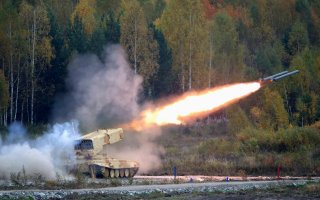NATO Head Stoltenberg Criticizes Russia for Ukraine Border Buildup
Earlier in the year, Russia had moved tens of thousands of troops toward the Ukrainian border, only to move some of them back after pressure from President Joe Biden. Now, it's at it again.
NATO Secretary-General Jens Stoltenberg chastised Russia on Monday for concentrating its military along the border with Ukraine on Monday, complaining that Moscow was insufficiently transparent in its intentions.
“NATO is closely monitoring the large and unusual concentrations of Russian forces close to Ukraine’s borders,” the secretary-general announced via Twitter. “We call on Russia to be transparent, prevent escalation & reduce tensions.”
Stoltenberg’s remarks came after his meeting with Dmytro Kuleba, the foreign minister of Ukraine, who raised the issue of Russian troops along the border. Following war games conducted along the border earlier in the year, Moscow simply left tens of thousands of troops nearby—a number that the Ukrainian government has estimated at roughly ninety thousand, and claimed that some of them had entered the territory in eastern Ukraine controlled by pro-Russian separatist groups.
Earlier in the year, Russia had moved tens of thousands of troops toward the Ukrainian border, only to move some of them back after pressure from President Joe Biden.
Russia has assisted the rebels in Ukraine’s eastern Donbas region, and in 2014, it occupied and annexed the Crimean Peninsula, in direct violation of a 1994 treaty that promised respect for Ukraine’s territorial sovereignty in exchange for the return to Russia of the nuclear weapons Ukraine had inherited from the Soviet Union.
During the meeting, Stoltenberg clarified that he did not expect Russia to launch a direct invasion of Ukraine, but emphasized that the concentration of troops was “unusual.”
“And we know that Russia has been willing to use these types of military capabilities before to conduct aggressive actions against Ukraine,” he said.
Ultimately, Stoltenberg indicated that he did not want to raise tensions between Russia and NATO, but advocated in favor of being “clear-eyed” and “realistic about the challenges we face.”
Kuleba argued that Ukraine needed to “be ready for all scenarios, for all options,” and suggested that NATO could help “to strengthen the resilience of Ukraine.” Ukraine is not a member of NATO but is on track to join the alliance, over Russia’s heated objections. Until it joins, NATO’s members are not obligated to protect it against possible Russian aggression.
Stoltenberg later announced that he had discussed the Russian buildup with other defense ministers within the European Union, as well as the migrant crisis on the Poland-Belarus border and the future of relations between the EU and NATO.
Trevor Filseth is a current and foreign affairs writer for the National Interest.
Image: Reuters

